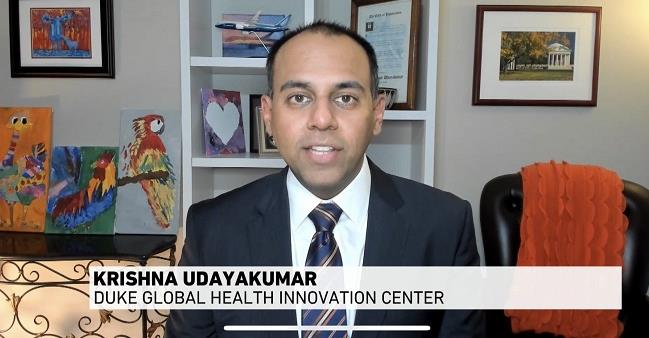Omicron’s rapid and relentless advance across continents proves once again that a global pandemic requires a global plan of attack. Most low-income countries have yet to achieve 20 percent coverage with COVID-19 vaccinations while most wealthy countries are close to 70 percent. Converting vaccines to vaccinations is becoming the key to winning the race between vaccines and variants.

The slow supply of vaccines has compounded structural and systemic challenges to transform vaccines into vaccinations in low- and middle-income countries (LMICs). Nearly 70 experts convened last week to examine these bottlenecks and craft a blueprint of actions to address them in a new report issued on Thursday, December 23, 2021, titled “From Airports to Arms: New Insights and Urgent Recommendations to Accelerate Global COVID-19 Vaccinations”.
The report discusses three cross-cutting challenges, specifically the need for national leadership and trust, timely access to financing, and prioritising speed and scale of vaccinations, along with multiple practical barriers to vaccination, which must be addressed simultaneously along with empowering country-level leadership and decision-making to end the pandemic everywhere.
“While high-income countries focus intensely on addressing their domestic challenges with the Omicron variant, we cannot lose sight of the urgent need for a coordinated, global response to curb this pandemic worldwide,” said Dr. Krishna Udayakumar, director of Duke University’s Global Health Innovation Centre.
“We must collectively commit to more effective, equitable, and urgent efforts, at national, regional, and global levels, to vaccinate the world and undertake additional public health measures that improve our response to this pandemic,” added Udayakumar.
The recommendations released on Thursday come from the COVID Global Accountability Platform (COVID GAP), led by Duke University and the COVID Collaborative, working alongside representatives from the World Health Organisation (WHO), UNICEF, and Africa Centres for Disease Control and Prevention (CDC), with support from The Rockefeller Foundation and the Bill & Melinda Gates Foundation.
“Timely, predictable access to high-quality vaccines remains an important challenge, but we must also urgently address bottlenecks to vaccination to get this pandemic under control,” said Dr. Ahmed Ogwell Ouma, Deputy Director of the Africa CDC.
“Vaccines arriving at airports is just the beginning of a journey that has many obstacles – from a lack of refrigeration, syringes and health workers to competing priorities – that can impede the path to vaccination. But there also are many ways to overcome them. Collaborations such as the one that has led to this report are critical to bring together national, regional, and global leaders to jointly tackle complex problems,” added Ouma.
With global production now reaching over one billion doses per month, “Airport to Arms” identifies important, practical strategies – and actionable recommendations – that can work in concert to convert vaccines into vaccinations. The report offers “cross-cutting” recommendation in three key areas and a blueprint for continued work by COVID GAP to identify additional strategies and solutions to accelerate vaccinations.
Substantial global support for country-led vaccination strategies and implementation must become an even higher global priority
Actionable recommendations are:
- Ensure a whole-of-government approach with high-level political leadership and accountability to increase trust and drive vaccination uptake.
- Establish cross-sector partnerships to augment government vaccination capabilities.
- Make global support for vaccine rollout more responsive to country priorities.
- Invest in regional engagement to improve and accelerate vaccination implementation.
Timely access to appropriate financing remains a major constraint for country-level vaccination and broader pandemic response
To provide the financial tools and resources to enable LMICs to scale-up effective vaccination, donors and multilateral development banks (MDBs) must simplify and speed up access to funding, and country-level and global costing projections must be updated and aligned to focus stakeholders on specific, shared targets.
Actionable recommendations are:
- Simplify and speed up access to funding from donors and multilateral development banks.
- Update and align country-level and global costing projections
With the urgency of an active global pandemic, immediate vaccination strategies should prioritise speed and scale, with the goal of transitioning to sustainability
Countries can accelerate progress by focusing on quick deployment of vaccines, linked to robust monitoring, surveillance, and feedback. Urgent investments into COVID-19 response can then be leveraged to strengthen longer-term health system capabilities.
Actionable recommendations are:
- Establish and adapt country-level vaccination strategy to prioritize the quick deployment of vaccines, linked to robust monitoring, surveillance, and feedback.
- Leverage urgent investments in COVID-19 response to strengthen longer-term health system capabilities.
“Millions of lives have been lost around the world despite the unprecedented pace of safe and effective vaccine development and scaled-up manufacturing leading to billions of doses,” said Ann Lindstrand, Unit Head, WHO.
“Inequitable access to these life-saving tools have prolonged the acute phase of the COVID-19 pandemic and cost lives, while upending livelihoods and economies. We offer actionable steps to change this trajectory and reduce global vulnerability to the COVID virus,” added Lindstrand.
The report outlines solutions to several technical impediments to accelerating vaccinations, including understanding vaccine demand, building up the health care workforce, addressing the supply chain and logistics, and improving data systems.
“We possess all the necessary tools and resources to urgently save more lives and end the pandemic more quickly,” said Benjamin Schreiber, ACT-A Coordinator, UNICEF. “We can, and must, do more to equitably vaccinate the world.”
